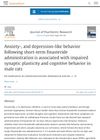 December 2023 in “Alzheimer's & dementia”
December 2023 in “Alzheimer's & dementia” Finasteride may help reduce anxiety and depression in elderly but might cause depression in young men.
 October 2024 in “Journal of Neuroscience Research”
October 2024 in “Journal of Neuroscience Research” Long-term Finasteride treatment reduces depression better than short-term treatment in rats.
 December 2023 in “Alzheimer's & Dementia”
December 2023 in “Alzheimer's & Dementia” Long-term use of a drug for hair loss and prostate issues can cause metabolic problems and depression-like behavior in young male rats.
 April 2024 in “Journal of psychiatric research”
April 2024 in “Journal of psychiatric research” Short-term finasteride use in male rats caused anxiety, depression, and memory problems.
 August 2021 in “Research Square (Research Square)”
August 2021 in “Research Square (Research Square)” Ferulic acid can reduce seizures and depression-like behaviors in catamenial epilepsy by balancing hormones and brain enzyme activity.
July 2024 in “Behavioural Brain Research” Long-term finasteride treatment reduces depression and brain issues in obese male rats.
 82 citations,
August 2006 in “Pharmacology, Biochemistry and Behavior”
82 citations,
August 2006 in “Pharmacology, Biochemistry and Behavior” Certain steroids in the brain affect mood and symptoms of depression, and treatments targeting these steroids show promise for improving these symptoms.
 18 citations,
September 2018 in “Experimental physiology”
18 citations,
September 2018 in “Experimental physiology” Electro-acupuncture may help treat PCOS in rats by changing brain DNA methylation.
 19 citations,
March 2019 in “Behavioural Brain Research”
19 citations,
March 2019 in “Behavioural Brain Research” Finasteride use can cause depression-like behavior in male rats.
 142 citations,
January 2019 in “Frontiers in Neuroendocrinology”
142 citations,
January 2019 in “Frontiers in Neuroendocrinology” Postpartum depression is linked to changes in brain chemicals, inflammation, stress, and certain genes, and can potentially be identified by markers like specific steroids, serotonin levels, and vitamin D levels.
 37 citations,
September 2018 in “Psychoneuroendocrinology”
37 citations,
September 2018 in “Psychoneuroendocrinology” Finasteride treatment in male rats causes long-lasting effects on depression-like behavior, brain cell growth, inflammation, and gut bacteria composition.
 4 citations,
August 2021 in “Biomedicine & Pharmacotherapy”
4 citations,
August 2021 in “Biomedicine & Pharmacotherapy” 5-alpha reductase inhibitors, like finasteride and dutasteride, may cause depression, but more research is needed to understand why.
 40 citations,
December 2019 in “Neurobiology of Stress”
40 citations,
December 2019 in “Neurobiology of Stress” Neuroactive steroids show promise for treating mental and neurological disorders by targeting GABA_A receptors.
 5 citations,
December 2022 in “Toxins”
5 citations,
December 2022 in “Toxins” Neurotoxins can affect neurotransmitter release and have potential in treating muscle, pain, and cancer conditions, but more research is needed on how they work.
 32 citations,
March 2021 in “Journal of endocrinological investigation”
32 citations,
March 2021 in “Journal of endocrinological investigation” Thyroid hormones are important for skin health and changes in them can affect conditions like hair loss and eczema.
18 citations,
September 2021 in “Journal of Neuroendocrinology” Neurosteroids can influence behavior by modulating brain inhibition, with potential for treating psychiatric disorders.
 4 citations,
July 2022 in “Medicina-lithuania”
4 citations,
July 2022 in “Medicina-lithuania” Women with Polycystic Ovary Syndrome (PCOS) often have higher levels of anxiety and depression, especially if they live in rural areas, have less education, don't have children, are over 30, or are obese.
 72 citations,
January 2011 in “Current Pharmaceutical Design”
72 citations,
January 2011 in “Current Pharmaceutical Design” S5αR inhibitors might help treat schizophrenia and other mental disorders but need more research.
 45 citations,
February 2019 in “Journal of Affective Disorders”
45 citations,
February 2019 in “Journal of Affective Disorders” Melatonin improved mental health and metabolism in women with PCOS.
 January 2025 in “Applied Sciences”
January 2025 in “Applied Sciences” Sulforaphane from broccoli may help treat certain cancers, hormone issues, and hair loss.
February 2024 in “Neurophotonics” Light therapy on the brain shows promise for treating brain diseases and improving brain function.
 26 citations,
December 2019 in “Neurobiology of Stress”
26 citations,
December 2019 in “Neurobiology of Stress” Post-finasteride syndrome causes lasting sexual, neurological, and physical side effects in some people after taking finasteride.
 197 citations,
January 2019 in “Neuropsychopharmacology”
197 citations,
January 2019 in “Neuropsychopharmacology” Male and female bodies respond differently to stress, influenced by hormones and development stages, with implications for stress-related diseases.
 10 citations,
December 2017 in “Chemosphere”
10 citations,
December 2017 in “Chemosphere” Bisphenol-A (BPA) increases connections between brain cells and boosts their activity, but it blocks the effects of a male hormone on brain cell plasticity.

Female rats showed more panic-related behavior than males, influenced by hormonal cycles and certain drugs.





















